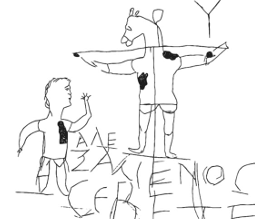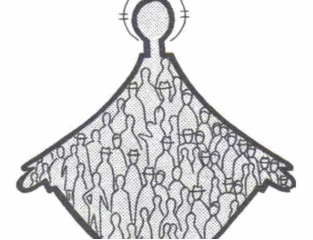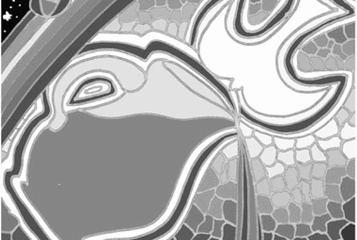Finding the beat with Ronan the sea lion.
A Sermon by Trevor Bechtel on August 24 2025
Some mornings I wake up and the windows have been left open and so I can listen to the dawn chorus, that symphony of bird song that accompanies the rising of the sun. It typically begins a few minutes before sunrise and continues for about an hour with many different species joining in and adding their voices to the throng.
It can be hard to sleep to this, but even though I loathe mornings and waking up I usually think that hearing the dawn chorus is a good thing. On those days that I fantasize about being a young adult science fiction writer I think this. That the world is a giant organic computer and that in order to function on any particular day it needs a set of instructions and the dawn chorus is the birds effort to secure the good functioning of our planet by coding those instructions in song just in time to achieve the day.
The dystopia writes itself at this point; with increasing urban noise competing and climate change driven population loss diminishing the bird population the world becomes less and less stable because the smaller more difficult to hear birds are not able to keep up with the coding requirements of a world spinning out of control.
Sorry. I very quickly lost the beat there.
Where was I.
Right. The sun rises and issues forth in chorus of bird song. It’s not hard to see God in that combination of events, and this has been true at least since the writing of Psalm 19.
The heavens tell God’s glory;
God’s handiwork the sky declares.
Day to day breathes utterance
and night to night pronounces knowledge.
There is a clear sense here that God’s glory is to be found in nature. I want to spend most of my time reflecting on this passage this morning and thinking about what it means to find God’s will in nature in this way. This is a a favorite topic of mine, but this is a brand new sermon! I’ll let you be the judge of whether I’m just repeating myself. I’ll also let you be the judge of whether or not that’s a bad thing if it is indeed happening.
I’m going to be using an inclusivized version of Robert Alter’s translation of this passage, which is a bit different than the one printed in your bulletin, but you’ll hear some of those differences and feel their impact differently with your bulletins open so I encourage you to follow along it you want. There is also a perfectly beautiful day happening right outside this sanctuary so if you’d rather follow along with that sermon go ahead and look out the window.
The parallelism of day to day and night to night show that God’s glory is manifested in each part of every day, in the brightness of the sunshine and the darkness of the night. Most of Psalm 19 will focus on the Sun, but here at the beginning we are reminded that the day is not more revelatory.
This is also a linguistic revelation. Day breathes utterance. Night pronounces knowledge. The Hebrew for breathes literally means wells forth. There is a sense that God’s glory is bursting forth in creations declaration, but this isn’t a revelation is opposed to language. It is language. But it is not a language spoken in words.
There is no utterance and there are no words, their voice is never heard.
Through all the earth their voice goes out, to the world’s edge their words.
A characteristic of Alter’s translation, resolved to some extent in The Inclusive Bible translation of our bulletin, is a very direct and sparse English translation of the Hebrew. Alter has a lot of confidence that English is a flexible language, able to carry the freight of meaning from Hebrew because of the flexibility of English grammar, which Alter then bends to breaking.
There is a contradiction here.
There is no utterance and there are no words, their voice is never heard.
Through all the earth their voice goes out, to the world’s edge their words.
There is a contradiction here, but it serves to emphasize the point that the Psalmist is making. This is a wordless language but it confident reaches every place on earth, and not just reaches them but occupies them as if a tent is set up there. The kind of tent that a groom or a soldier would reside in, running their course.
All of creation is implicated in showing forth God’s glory, but a particular focus is given to the Sun in this Psalm. The Sun was a ready object of attention in the Ancient Near East, especially in Egypt and Babylon. Many readers of this Psalm see a connection to those ideas here, but everywhere in the Bible the Sun is always seen as in God’s control. God sets up a tent for the Sun. Alter’s translation continues,
For the sun God set up a tent in them–
like a groom from his canopy comes,
exults like a warrior running their course.
There is here a contrast between the Sun worship of Egypt or Babylon and God’s insistence that God alone is to be worshipped by God’s people. There is also a very clear connection between the God’s teaching as explicated in the next few verses and the glory of God that is seen in God’s creation.
This true, just, wise, steadfast, fearful teaching of God is to be desired more than anything.
More desired than gold,
than abundant fine gold,
And sweeter than honey,
quintessence of bees.
The Hebrew here uses two words for honey so the Hebrew reads literally “honey honey”. The purpose of using two similar terms in Hebrew poetry is to offer a hyperinstenification that indicates that this is the sweetest of all possible honeys, “quintessence of bees”.
The layering of the biblical poetry at this point is powerful so I would ask that we pause and repeat ourselves here.
Could you close your eyes and open your mouth.
Now imagine gold and refine your imagination to picture abundant fine gold.
Keep that gold in your mind and now illuminate it with the Sun.
See how it glows warmly, warmly like the sun.
Keep this warm sunlit gold in your mind’s eye and now imagine into your mouth comes some honey. It tastes like the sweetest honey you have ever tasted but remember that honey is not sweet like stevia, or sugar, or aspartame. Honey is sweet like honey. The honey is warm like the sun, and golden.
Understand how these layers of tastes and visions and textures and heat are revealing to you God’s glory. Gold and honey and warmth and God’s truth are all the same thing and you can understand this knowledge even though it is not relayed to you in words.
You can open your eyes now and close your mouth.
Now I imagine that you are wondering what this all has to do with Ronan the Sea Lion.
Let me try and explain.
If you’ve watched Death of a Unicorn you remember Jenna Ortega saying that the last couple hundred years haven’t been particularly helpful in terms of thinking about the world as it actually is. That’s a paraphrase. It’s not a particularly good movie. Susan abandoned me after about 35 minutes when she was finished eating supper. Sorry. I am losing the beat again.
Commonly when we look to nature we imagine that we are encountering something other than culture. We are encountering something other than language. But Psalm 19 fights against our desire to separate the world in this way. The world is one holy breath and we are a part of it.
Our first attempts to communicate with animals were based on trying to teach them our language. There were some good starts. Peter the dolphin lived in a house with Margaret Howe Lovatt to see if Peter could learn English cause dolphins are smart, but while he made some progress he didn’t really get it. Koko the Gorilla learned 1000 words in American Sign Language and understood 2000 spoken words. That’s more impressive but you need 3000 words to function in day to day English and that only gets you 95% of the way there. An average active vocabulary is 10-20 thousand words. Many people understand more than 35000 words.
The general human response is that animals aren’t smart enough to learn our language, but we are waking up to the realization that learning English is not the be all and end all of communication. Why can’t we learn dolphin or gorilla or chimpanzee? How do we know that their communication is not just as subtle and attentive to God’s glory as ours.
Musical knowledge might be better at getting at the root skills necessary for communication. The rhythmic undercurrents of language could be a better point of connection between different species.
Ronan shows that animals might be just as competent if not more competent at us at those rhythms. Ronan doesn’t lose the beat.
Chimpanzees drum on trees to communicate over longer distances than they can shout. They have personal signature drum patterns. Chimpanzees in West Africa drum differently than Chimpanzees in East Africa and researchers think that this rhythmic expression could be at the roots of human language. Why do they drum differently? They live in different kinds of societies with different amounts of resources. The more hierarchical chimpanzees have more ordered drumming.
The differences between republicans and democrats, between rich and poor, between those who want control and those who want inclusion, these differences are natural. We should still seek to resolve them, but they aren’t just an artifact of our being human.
There is a lot more work to do here than I can manage this morning, and there is a whole bit about how language detaches itself from humanity in A.I.’s large language models that I’m not going to get to, but here is one thing that I do want to say.
In Psalm 19 God sets up a tent for the Sun.
This was God taking a side against the Sun worship of Egypt and Babylon.
We should also imagine that God sets up a tent in the midst of our differences.
And God is not neutral, or set apart from the workings of the world. The path that Deb Rhizal laid out for us last week is a holy path engaging the whole of the world as we have it and looking for God’s will in the middle of all it. There is no way for us to be set apart from the world, and there is no way for the world to be set apart from us. There is no way for us to be set apart from God, and God sets up God’s tent in us.
God is wordless language welling forth in justice, wisdom, steadfastness and peace. God is engaged in our differences. God is choosing sides.
I believe in the pure unadulterated wordless language of God and I agree with the Psalmist when they say we know we are speaking it when we find ourselves pleasing in God’s sight. I hope that we can start to learn how to find its rhythm and not to lose the beat.


